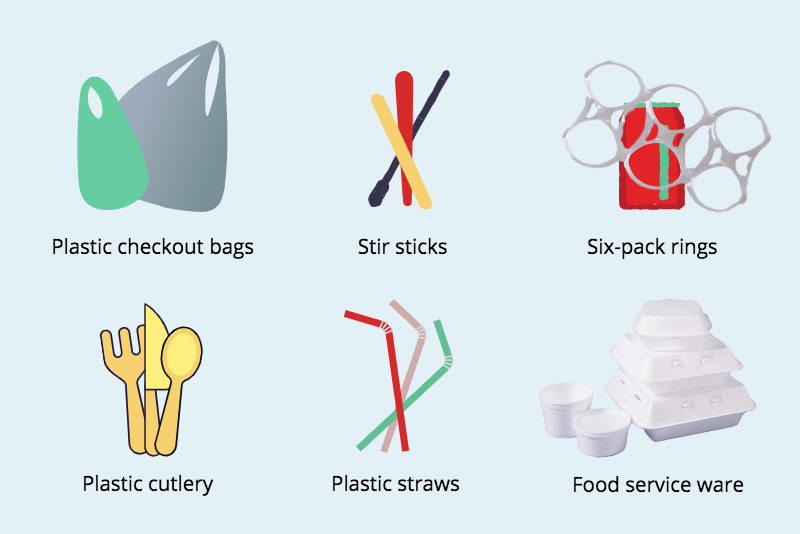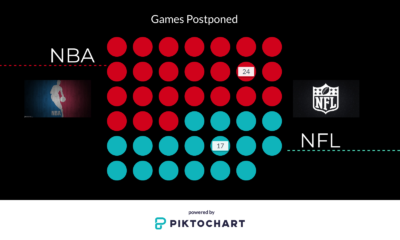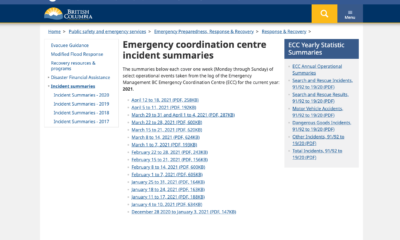Opinion
Opinion: Canada Should Expand its Single-Use Plastics Ban
The current proposed ban on single-use plastics is insufficient. More harmful plastics should be banned in order for the new policy to successfully combat plastic pollution.
The issue of plastic pollution has gained a lot of traction in recent years and in response, many countries have begun imposing plastic bans. This includes Canada, which is currently in the process of formulating a single-use plastic (SUP) ban to come in effect by the end of this year.
Last October, the Canadian government released a discussion paper on its proposed plan to shift the Canadian plastic economy from linear to circular by banning some SUP items based on certain criteria.
Underwhelmingly enough, the list included a staggering total of six items: plastic checkout bags, stir sticks, six-pack rings, cutlery, straw and food service ware.

This is profusely insufficient as it excludes many important SUPs that do meet the ban’s qualifications.
Environment Minister Jonathan Wilkinson himself recognized the small impact the ban will have, stating that it covers “a fraction of one percent” of the SUP products we use.
We are long past the point where we can rely on minimal-impact solutions to combat plastic pollution. The environment requires unreserved and effective actions, something the current proposed ban cannot achieve.
Public opinion and ENGOs
According to a poll commissioned by Oceana Canada, an environmental NGO, two-thirds of Canadians polled want to see other harmful items added to the list, including hot and cold drink cups, cigarette filters and styrofoams.
Staff at Oceana Canada are also unimpressed with the ban. “There is public appetite for stronger federal action,” said Oceana Canada plastic campaigner Ashley Wallis in a press release. “Now is the time to meaningfully reduce plastic production and use, including banning more of the unnecessary and harmful single-use plastics that are choking our life-sustaining oceans.”
Not only is a majority of people siding with the ban’s expansion, but enough scientific evidence shows that a wider ban is exactly what the environment requires.
Scientific evidence
Two independent studies published in the journal Science last September found that the rapid growth of the plastic industry is outpacing our ability to collect and recycle plastic waste and in turn, is the principal culprit for the exponential amounts of plastics found in the seas. Both studies came to the conclusion that decreasing the production of virgin plastic is fundamental to reduce plastic waste.
In relation, according to a peer-reviewed article published on Science Direct, landfilling is currently the main disposal method of SUPs which enables large amounts of plastics to continuously leak into the environment. As they degrade into microplastics, SUPs release toxic chemicals in the air and contaminate the soils and waters.
Microplastics contamination is on a steady rise, to the point where researchers have recently discovered that humans are ingesting thousands of pieces per year.
Unfortunately, despite those findings, only few studies have been conducted on the specific effects of plastics on the environment and human health–a primary argument of the plastics industry which sides against the adoption of a plastic ban.
But the little data that exists to date is all the more reason to prevent further environmental harm, especially when the lack of science is partly due to plastics’ decomposition into microplastics.
“It’s hard to track what happens to consumer products… since their disintegration into microplastics makes them hard to identify,” said environment scientist Max Liboiron.
Hence, eliminating the identifiable threat rather than waiting until it decomposes into unmeasurable tiny pieces whose effects remain unknown is the safe and responsible thing to do.
-

 Lifestyle4 years ago
Lifestyle4 years ago‘I love you so much it hurts’: Domestic Violence Awareness & Resources
-

 Uncategorized4 years ago
Uncategorized4 years agoThe NBA’s fight against COVID-19
-

 Uncategorized4 years ago
Uncategorized4 years agoThe Raptors’ NBA title window is closed
-

 Uncategorized4 years ago
Uncategorized4 years agoA simple Python web scraping guide for journalists
-

 Sports4 years ago
Sports4 years agoFred VanVleet drops 54 points, breaks Raptors franchise record
-

 Uncategorized4 years ago
Uncategorized4 years agoNorth Shore Rescue sees a busy winter season with a record-breaking 2020
-
Uncategorized4 years ago
Lessons the NHL can learn from the NBA
-

 News4 years ago
News4 years agoFord Government’s controversial use of MZOs in Duffins Creek development
